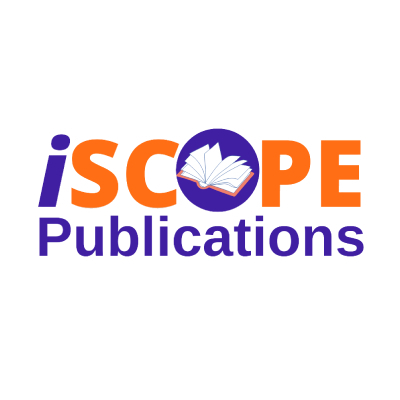Notifications
ALL BUSINESS
COMIDA
DIRECTORIES
ENTERTAINMENT
FINER THINGS
HEALTH
MARKETPLACE
MEMBER's ONLY
MONEY MATTER$
MOTIVATIONAL
NEWS & WEATHER
TECHNOLOGIA
TV NETWORKS
VIDEOS
VOTE USA 2026/2028
INVESTOR RELATIONS
COMING 2026 / 2027
ALL BUSINESS
COMIDA
DIRECTORIES
ENTERTAINMENT
FINER THINGS
HEALTH
MARKETPLACE
MEMBER's ONLY
MONEY MATTER$
MOTIVATIONAL
NEWS & WEATHER
TECHNOLOGIA
TV NETWORKS
VIDEOS
VOTE USA 2026/2028
INVESTOR RELATIONS
COMING 2026 / 2027
About Me
 ISCOPE Publications
ISCOPE Publications ISCOPE Publication is a world-class research and development organization that offers end-to-end services for writing and publishing research papers and Ph.D. theses in various fields of study. We have a team of experts who guide our clients throughout the process of research and publication. We also help our clients to publish their papers in reputed scopus indexed journals and organize and participate in scopus indexed conferences. ISCOPE Publication is the ultimate solution for your research and publication needs. Contact us today and let us know how we can assist you.
 ISCOPE Publications -
Apr 1 -
Other -
#education
-
362 views -
0 Comments -
0 Likes -
0 Reviews
ISCOPE Publications -
Apr 1 -
Other -
#education
-
362 views -
0 Comments -
0 Likes -
0 Reviews

Academic research, publishing in top-tier journals and presenting at prestigious conferences is gaining recognition and advancing in your career. Among many respected academic platforms, Scopus stands out as one of most trusted indices for research publications. Scopus-indexed journals and Scopus indexed conferences 2025 are calling for papers, providing an excellent opportunity for researchers, academicians, and scholars to showcase their work on a global stage.Process of getting published in Scopus-indexed journals or presenting at Scopus indexed conferences 2025 can be competitive, but rewards are significant: increased visibility, enhanced credibility, and the potential to contribute to the advancement of your field. Whether you're submitting research to Scopus-indexed journals or aiming to present at one of the prominent Scopus indexed conferences 2025 exposure and networking opportunities available are invaluable. Everything you need to know about the 2025 call for papers, how to submit your research, and why these opportunities are ones you simply can't afford to miss.
Does Scopus Only Show Peer-Reviewed Articles?
What is Difference Between Scopus and Journal?
What is a Journal, and How is it Different from a Diary?
Scopus is one of the world’s largest and most reputable abstract and citation databases for academic research. With over 80 million documents from more than 5,000 publishers, Scopus is an invaluable resource for both researchers and institutions alike.
Scopus indexed journals are those that have been included in Scopus database, which is known for its rigorous selection criteria. These journals cover a wide range of disciplines, from engineering and science to arts and social sciences. Being published in a Scopus indexed journal signifies that your research has met high academic standards and can be easily accessed and cited by researchers worldwide.
Why Scopus?
Scopus provides academic community with quality content that is regularly cited, highly indexed, and thoroughly vetted. Journals included in Scopus are highly respected and recognized in the academic community for their contribution to research and development. Publishing in Scopus-indexed journals can significantly enhance your academic reputation.
How to Improve Your Journal’s Scopus Impact Factor?
Top Q1, Q2, Q3, and Q4 Journals Indexed in Scopus
As we approach 2025, the academic landscape continues to grow and evolve. Researchers from all corners of globe are making groundbreaking contributions, and journals are keen to publish fresh, insightful, and impactful research. So, why should you submit your paper to Scopus-indexed journals this year?
One of the main advantages of publishing in Scopus-indexed journals is global exposure your research receives. Scopus is widely accessible to academic institutions, libraries, and individual researchers worldwide, allowing your work to reach a broader audience and have a lasting impact.
When your paper is indexed in Scopus, it becomes easily discoverable by other researchers. This leads to more citations, which can boost your h-index (a metric used to measure the productivity and citation impact of a researcher) and increase your academic reputation. Higher citation counts can be especially important for your career progression, as they serve as an indicator of the relevance and importance of your work.
Publishing in high-impact journals can open doors to new career opportunities, whether in academia, industry, or research institutions. Many universities and research bodies require publications in Scopus-indexed journals as part of their criteria for promotions, grants, and funding. Submitting your research to these journals in 2025 can have long-lasting career benefits.
Fast Publishing Scopus Indexed Journals in 2025
ChatGPT for Research Paper Writing: Tips to Effective Academic Practices
Scopus-indexed journals accept a wide range of academic papers, depending on the discipline and scope of journal. Some common types of papers you can submit include:
These are the most common type of submissions. Original research articles present new findings, methodologies, or theoretical developments in your field. They often include data analysis, experiments, and results that contribute to the body of knowledge.
Review summarize existing literature on a particular topic, synthesizing findings and highlighting key trends or gaps in research. Writing a comprehensive review e can position you as an expert in a specific area and can be highly cited.
Short communications are concise papers that present preliminary or novel research findings. These typically shorter than full-length research articles but still provide valuable insights into a specific topic.
Case studies explore specific instances, events, or phenomena in depth. These papers can be particularly relevant in fields like medicine, business, and social sciences.
Theoretical papers are often mathematical, philosophical, or conceptual in nature. These papers focus on developing or refining theories, models, or frameworks to better explain observed phenomena.
Technical notes are focused on explaining new methodologies, techniques, or technologies used in research. These papers often have a practical or applied aspect.
Scopus Journal Metrics: What Every Researcher Should Know
Scopus Indexed Journals: How to Publish Without Paying Fees
Choosing the right journal for your paper is crucial. Not all Scopus-indexed journals are the same, and selecting the appropriate one can help ensure that your paper reaches right audience. Here’s how to select the best journal for your submission:
Every journal has its own focus, whether it’s a specific area of science, technology, or humanities. Make sure the subject of your paper aligns with the journal’s focus area. This increases the likelihood of acceptance and ensures that your research reaches the most relevant audience.
Impact factor of a journal indicates its importance and reputation in the field. While submitting to high-impact journals can be competitive, it often leads to better recognition and citations. Be sure to check journal’s impact factor and its standing within your field.
Each journal has specific submission guidelines, including formatting requirements, word limits, and the types of research they accept. It’s essential to review these guidelines carefully to ensure your submission is accepted. Following these rules can improve the chances of your paper being reviewed favorably.
Some journals have quicker turnaround times for reviewing and publishing papers. If you’re looking to publish your work sooner, it may be wise to select a journal that offers faster reviews and shorter publication cycles.
What is the Acceptance Rate of Scopus Journal?
Before you submit your paper to a Scopus-indexed journal, you’ll need to make sure it’s polished and ready for review. Here are some tips to ensure your submission meets the journal’s standards:
Abstract is first thing that reviewers and readers will see, so make sure it’s clear, concise, and summarizes your research effectively. A strong abstract should highlight the research question, methodology, findings, and implications of your study.
Ensure that your paper is original and has not been previously published elsewhere. Plagiarism is a serious issue in academic publishing and can lead to rejection. Use plagiarism detection tools to confirm the originality of your work.
Each journal will have specific formatting requirements, such as font size, margins, and reference style. Pay attention to these details to avoid having your paper sent back for revisions or rejected outright.
Depending on your research, you may need to include supplementary materials like data sets, charts, or figures. Be sure to prepare these materials in a clear and accessible format, as they may be reviewed along with your main paper.
Once your paper is ready, it’s time to submit it to the chosen Scopus-indexed journal. Here’s an overview of the typical submission process:
Most Scopus-indexed journals require authors to create an account on their online submission portal. This is where you will upload your paper and track the progress of your submission.
After logging in, you’ll be prompted to upload your manuscript and any supporting materials. Make sure that your files are in the correct format (usually Word or PDF) and follow the journal’s submission guidelines.
In addition to uploading your paper, you’ll typically need to fill out forms with details such as your name, affiliation, paper title, and a brief description of the research. Some journals may also ask for a list of potential reviewers.
Once submitted, your paper will undergo peer review, where experts in your field will evaluate its quality, originality, and relevance. This can take several weeks to a few months. You may receive feedback requesting revisions or clarifications before your paper is accepted for publication.
If your paper is accepted with revisions, you will need to address the reviewers’ comments and resubmit your paper. Once the revisions are approved, your paper will move to the final stages of publication.
Once your paper is accepted, it will be published in the journal and indexed in Scopus. You will typically receive a DOI (Digital Object Identifier) for your paper, making it easily discoverable and citable.
Academic world is brimming with opportunities in 2025, and the call for papers in Scopus indexed journals and Scopus indexed conferences 2025 offers a gateway to global recognition, enhanced visibility, and long-term academic success. By submitting your research to these prestigious platforms, you are not only contributing to the advancement of your field but also positioning yourself for career growth and networking opportunities that can open doors to new collaborations, funding, and professional development.Competitive nature of Scopus indexed publications and conference presentations should not deter you; instead, it should motivate you to refine your research, follow submission guidelines meticulously, and take full advantage of the exposure that comes with being featured in such well-respected venues. Whether you aim to publish an article or present your findings at a high-impact conference, the rewards far outweigh the effort.
